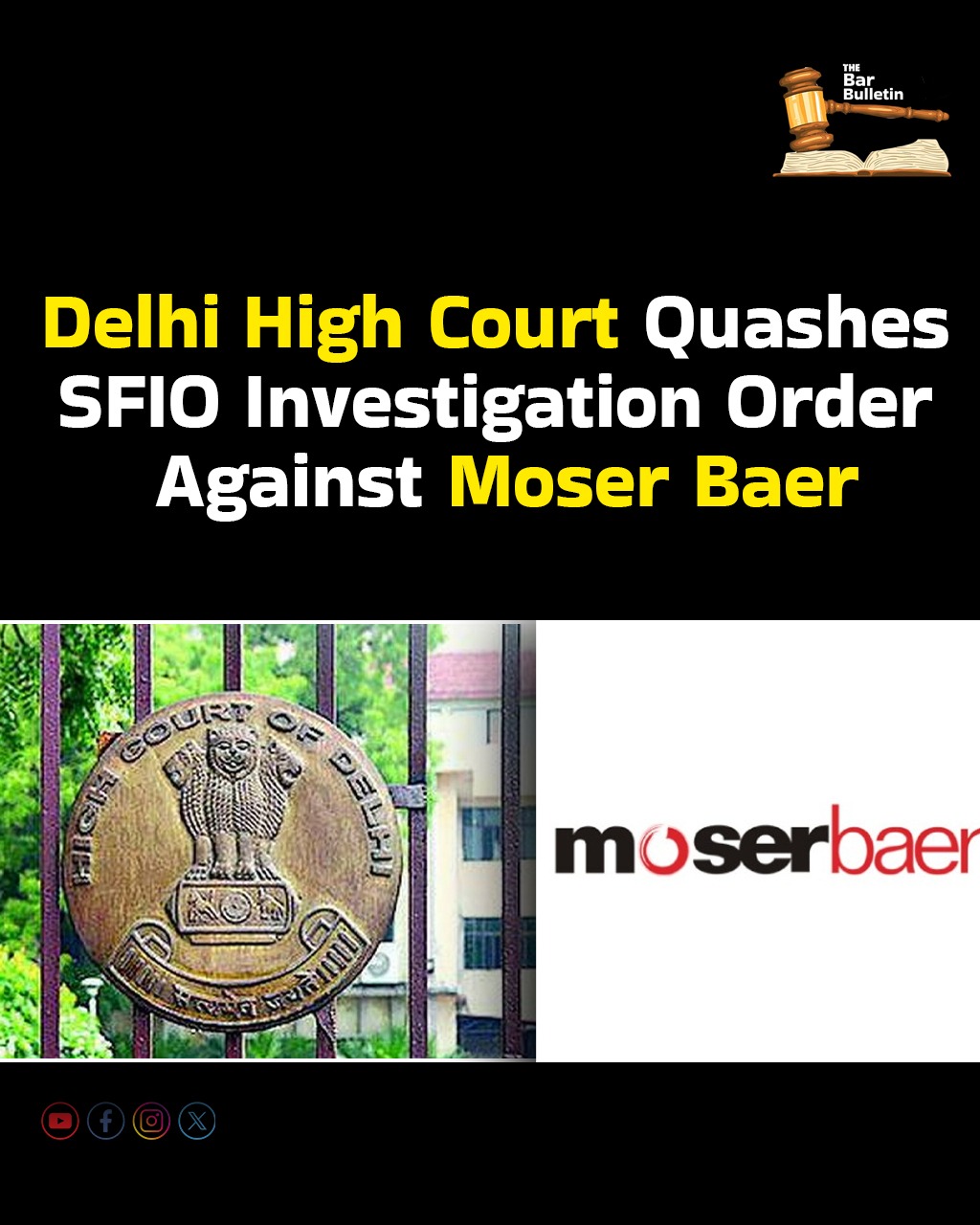The Delhi High Court allowed a writ petition filed by an ex-director of Moser Baer India Ltd. and quashed an order dated September 5, 2024 issued by the Ministry of Corporate Affairs directing SFIO investigation under Section 212(1)(c) of the Companies Act, 2013. Justice Sachin Datta held that the existence of circumstances relevant for formation of opinion for the purpose of Section 212(1)(c) of the Act, 2013, must be demonstrable and that the impugned order was based on non-existent circumstances.
The petitioner was an ex/suspended director of Moser Baer India Ltd. which was incorporated in 1983 by the petitioner’s late husband and engaged in the manufacture of CDs, DVDs, and other optical media. In 2012, MBIL sought relief under the RBI’s CDR Scheme and, based on forensic audit reports, was classified as a ‘Class B’ borrower and admitted into the CDR framework, not as ‘Class C’ or ‘Class D,’ which are typically assigned to entities suspected of fraud or financial irregularities. The company was not subjected to any onerous conditions during CDR admission, indicating no irregularities existed at that time.
In 2017, MBIL entered insolvency proceedings before the NCLT, New Delhi, and the Interim Resolution Professional, at the CoC’s instance, commissioned a Forensic/Special Purpose Audit covering financial years 2015-2018. The Sikdar Report revealed no adverse findings, and during the CoC meeting on 05.05.2018, the Committee accepted the report, confirming no evidence of Preferential, Undervalued, Fraudulent, or Extortionate (PUFE) transactions by MBIL.
Bank of Baroda subsequently declared, ex-directors of MBIL, as “Wilful Defaulters,” but this was challenged in W.P.(C) No. 4181/2023. A coordinate Bench set aside the Identification and Review Committee’s order, holding that the banks should have investigated potential fraud, malfeasance, or diversion before admitting MBIL into the CDR. The Division Bench in LPA No. 396/2024 also dismissed the appeal on August 8, 2024, noting that forensic audit reports lacking complete factual material carry ‘little credibility’ and cannot form the basis for cognate proceedings.
The petitioner argued that the impugned order was ultra vires Section 212 of the Act, 2013, as it ignored the statutory prerequisites and was based on a flawed assumption that the forensic audit reports revealed preferential, undervalued, extortionate, and fraudulent transactions (PUFE). They contended that the formation of “opinion” under Section 212(1)(c) was invalid, having been made despite the absence of any relevant circumstances. The respondent countered that the issues in the BOB judgment were entirely different, and any procedural lapses by the Bank of Baroda could not restrict the SFIO in exercising its statutory functions, emphasizing that the findings in the impugned order were grounded on the Sikdar and GSA Reports.
The Court noted that, following the Bombay High Court judgment in Parmeshwar Das Agarwal & Ors. vs. The Additional Director (Investigation) Serious Fraud Investigation Office & Ors., 2016 SCC OnLine BOM 9276, circumstances for forming an opinion under Section 212(1)(c) must be demonstrable, and the Central Government must justify assigning an SFIO investigation, a principle upheld by the Supreme Court. The Court observed that the impugned order failed to show such necessity and was also silent on whether the statutory inquiry under Section 206(4) was conducted or the books were inspected under Section 206(5), leaving crucial procedural steps unfulfilled and creating a clear legal gap.
The Court found that the impugned order misrepresented the findings of the forensic audits, as it copied material from the Sikdar Report, which explicitly stated it was prepared on a ‘test check basis,’ was not a full audit, and was intended only for the Insolvency Professional within a limited mandate. The order also wrongly claimed PUFE transactions in Moser Baer, whereas the Sikdar Report negated any such transactions, and the GSA Report confirmed that its review period did not allow for assessment of diversion or fraudulent activity, with most asset transactions occurring prior. This misstatement in the impugned order directly undermined its validity.
The Court emphasized that the coordinate Bench in the BOB case held that reliance on the GSA Forensic Audit Report was misconceived, as the report itself negated any diversion or siphoning of funds. The Division Bench also noted that an FAR issued without all necessary factual and statistical material carries little credibility.
Conclusively, Justice Datta held that while the Central Government’s formation of opinion under Section 212(1)(c) was subjective, the circumstances forming its basis must be demonstrable. The Court found that the impugned order was issued in a casual manner, ignoring statutory prerequisites, and accordingly quashed the order dated September 5, 2024.
Appearances:
Petitioner: Dr. Abhishek Manu Singhvi (Senior Advocate) with Vaibhav Mishra, Ekansh Mishra, Avishkar Singhvi, Rajeev Goyal, Vijay Aggarwal, Rachit Bansal and Shubham Tiwari, Advocates
Respondent: Rupali Bandhopadhyay (CGSC) with Abhijeet Kumar, Advocate



